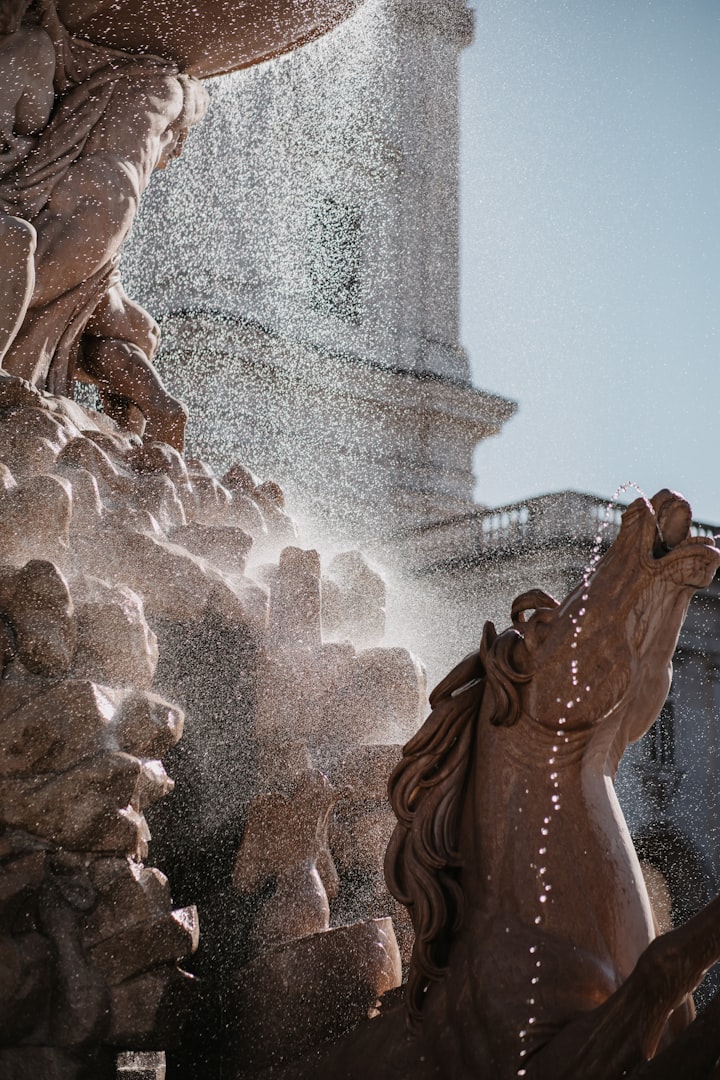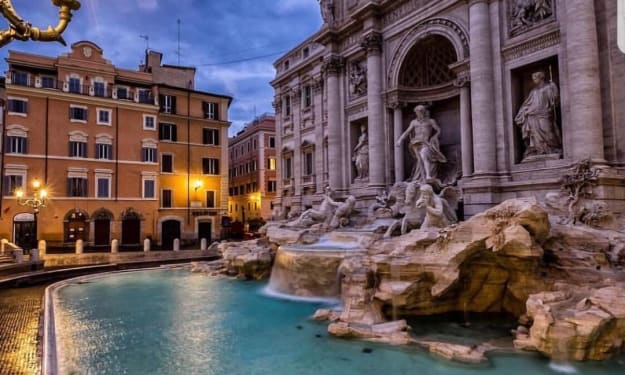
Every day an estimated 3,000 euros are thrown into the Trevi Fountain in Rome.
Moonlight dances on Metasabia’s Ethiopian skin. She stands on the tiny terrace of a large estate building, the heat of this Summer night gathered moistly on her pores. In her arms she holds her breastfeeding baby who she almost lost at birth 6 months earlier. Her suckle is so forceful it’s hard to believe she touched death. She named her daughter Minyoti, the Amharic word for ‘wish’. Metasabia has always believed in wishes and now even more so. In the distance, the round roof of the Vatican seems to mirror the moon both in shape and glory.
Meti, as her mother used to call her, sits on the fluorescently lit night bus that carries her into the heart of Rome. Her daughter is engulfed in a sling that rests on her front, creating the illusion of a continued pregnancy. They are usually alone, in life and on this bus. On her first few commutes the driver would halt with a screech and a sigh as if picking up passengers wasn’t part of his job, as if she’d bagged the wind of his sails. Now he knows her. He begins to slow down a few turns away. Once he even waited for her. Meti has seen only one other passenger on the bus, but she doesn’t think he saw her. His head was bowed over a small black notebook in which he scribbled furiously.
Gabriele started writing when he was nine. His father died at his feet of a heart attack, asking for a glass of water that Gabriele was too short to reach. He wrote because he didn’t understand. He wrote because on the pages of his black books, nine year olds could always reach the water. He grew up without money and, at eighteen leapt at the offer of a temporary job at the game arcade. This ‘temporary job’ has now lasted ten years. In his higher silence, he loves the chiming bings from the pinball games, the recorded crowd-cheering, the coin slots, the glowing machines, the thin patterned carpets, the smell of copper. But in the noise of everyday life he desperately wants to leave. His suitcase, consisting of twenty small black notebooks, one sweater, one coat, a small Chinese teapot his mother gifted him, a photo of his father holding a dead chicken and a wetsuit, has been packed for the last three years.
Gabriele lives on the edge of the city. He wakes and sleeps at strange times but they’re not strange for him. He enjoys Rome at twilight. He enjoys walking along the highway that leads to the ancient centre. He enjoys the knowledge that for these brief nocturnal hours the road belongs to him and not the machines it was built for. Only once did he not walk. The rain nailed at his skin until, drenched, he took shelter aboard the night bus.
Twilight, the darkest and most silent hours. A pair of worn brown leather shoes balance on the edge of The Trevi Fountain. Its surface reflects moonlight onto the surrounding buildings, bathing them in a glow that holds both water and fire. A large ripple splashes over the edges, wetting the laces of the right shoe. In the fountain, barefoot, with his trousers rolled up past his knees, stands Gabriele. He holds a wooden broom and vigorously brushes the fountain floor. He wades from one side to the other, ensuring that the entire basin is swept. He places the broom near his shoes and picks up a large net that resembles something you might buy from the kiosks of Coney Island. If it weren't for its size it would be mistaken for a toy. Gabriele lowers the net into the water. As it surfaces, the light reflected on the encircling buildings begins to glisten and dance. The moonlight is now mirrored, not by water, but by thousands upon thousands of wishes. Wishes in the form of coins.
The bus driver knows Meti’s stop, she no longer rings the bell. Rome’s yellow street lights guide her along its cobbled labyrinths to her place of work. She has never visited the Trevi Fountain at daytime. To do so would mean to unhem the mystery in which she has veiled it, like a lover first seen clothed in daylight. She chose not to learn the histories of the statues that watch over the fountain. She chose to create her own mythologies in which the statues gaze back at her while the whole world gazes at them, unrequited. She had yet to encounter any nighttime visitors so the sight of a tall skinny man in worn brown leather shoes walking away from the fountain, dragging a large wheelie bag, startled her. Her heartbeat jumped in such thuds that Minyoti’s heart echoed swiftly culminating in a loud sob. The skinny man in brown leather shoes turned his face towards them allowing Meti to see that she knew this man as the only other person encountered on her night bus.
Gabriele knew her too. While preparing for this expedition he had sat himself in the darkest corner of the square and waited for the fountain cleaners to arrive. He had expected a small group of maybe five to six, sturdy looking men, possibly travelling in a truck or at least a van, loaded with cleaning equipment that looks like something you might be able to travel to Mars with. His heart flickered when instead he saw a young woman arrive carrying a baby. She greeted the statues one by one and Gabriele almost believed they greeted her in return. She then disappeared behind the fountain and returned dragging behind her a large pressure washer.
Gabriele had never drawn. Writing was the only creative expression he had ever needed, that is, until the moment he saw her at the fountain. He put pen to page expecting a flow of words, maybe something Shakespearian, maybe something about a fluttering heart on a Summer’s night, maybe even something tragic. But instead the tip of his pen formed shapes, the shapes formed a body, two bodies one much smaller than the other, and a third body, of water all in the body of the night. This was the closest he had ever come to experiencing a miracle. He returned and waited the following nights filling the pages of his small black notebooks with her. So when he hears the baby’s cry and turns to finally be seen in return, it fills him with sorrow to not be able to stay.
The skinny man turns the corner, vanishing behind peach coloured walls. Meti removes the high pressure washer from the storage closet and sprays the marble clean. There seem to be less coins than usual but this doesn’t bother her. She thinks about all the wishes in the water, about the people they belong to, about their lives and what the wishes might mean to them. She wonders whether the skinny man had come here to throw his own coin into the fountain. She wonders what his wish might be.
In the dark of the arcade, illuminated only by the coloured lights of the game machines, Gabriele uses an enormous soda cup to scoop up the wish coins. He pours them, cup after cup, into the filter funnel of the change machine, which in return delivers note after note. Twenty thousands worth. In the hands of children the notes had been roughly treated. Gabriele carefully smooths each bill and inserts them page by page into his black notebooks until they bulge with secret wealth. He withdraws his suitcase from the supply cupboard, removes the travel coat and deposits the cash filled notebooks in its place. With the suitcase for a pillow and his coat as a modest blanket he curls up beneath the cool wind of the air-hockey table and falls asleep to the rhythmic rattle of unseen machinery.
A mobile with coloured elephants rotates slowly on the ceiling above Minyoti’s crib. Moved by the room’s currents, the mammals seem to walk circles around each other. Meti sings a gentle lullaby, she sings the same lullaby every night. It tells her daughter that it is time to dream, it tells her daughter that she is safe. Minyoti’s breathing deepens and slows as her tiny being shifts into temporary rest. With her rest comes her mother’s rest too.
The Fountain of the Four Rivers is situated a lazy stroll’s distance from Trevi. Aside from one towering central pillar, the architecture of this second heist is less majestic. The redeeming element is a pillar that looms magnificently over the water, intricately sculpted in mythic details.
With his suitcase and wheelie bag waiting patiently to carry this final haul, Gabriele wades into the waters, partially obscured by the moon shadow of this great obelisk. In a few more minutes he will have gathered enough wishes to leave this ancient city, to live in the daytime, maybe even to find love. As he raises his net to the surface of the water carrying the last of his stolen goods, his attention is caught by a large splash created on the opposite side of the fountain. He scans his surroundings seeking the cause of this disruption. With dread and courage, he looks up to the sky to discover that the greatly admired central pillar has begun to crumble, releasing fragments of itself onto the ground below. Gabriele knows that no matter how quickly he moves, no matter how agile he becomes, he will not escape the collapse. And so he welcomes it. In the split second before a chunk of marble the size of a football crashes into his left temple, he beholds in exquisite clarity the craftsmanship of the tender female hand engraved on its surface.
Time bares itself fully, exposing the infinity between seconds. A procession of dreamlike moments: the morning light in his mothers hair, the taste of cereal, a large mole on his father’s back, his first kiss, a tear-wet pillowcase, his maths teacher’s voice, the toss of his own wish into a brightly lit fountain, his mother’s eyes, his mother’s hands, his mother’s laugh. Her cry. But it isn’t her cry.
The skinny man lays dying in the Fountain of the Four Rivers. The glistening coins fade from sight as a cloud of blood trickles from his skull into the surrounding water. Meti crouches down near him and holds his head in her arms. His left hand floats upwards with his index finger outstretched, sending a ripple of red in the direction of his belongings. “My notebooks,” he smiles, “Yours”. Meti sings her lullaby, it tells Gabriele that it is time to dream, it tells him that he is safe. In the cradle of this young mother and her child, he passes on to the longest night.
As twilight becomes dawn, the night bus carries Meti and Minyoti back home. She opens the suitcase that now belongs to her, a stack of black notebooks occupy most of its capacity. She turns to the first page of the first notebook and learns the skinny man’s name, “Gabriele”. She whispers it. Sirens wail in the distant city centre as she continues to turn the pages of Gabriele’s notebooks, layered with carefully placed banknotes. Page after page, twenty thousand euros, and the twilight portraits of mother and child by a man no longer breathing.





Comments
There are no comments for this story
Be the first to respond and start the conversation.